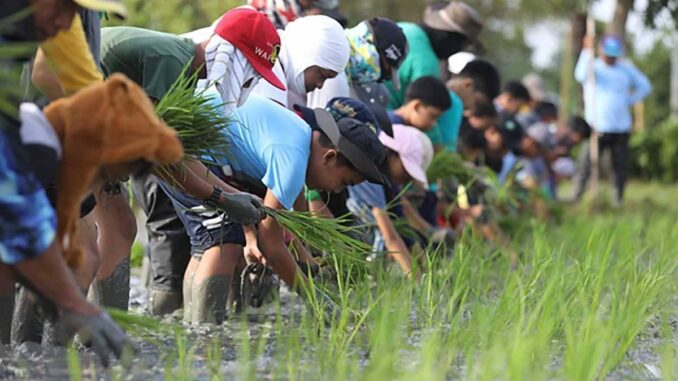
AMID a decline in the number of young Filipinos becoming rice farmers, the Department of Agriculture-Philippine Rice Research Institute (DA-PhilRice) has launched new initiatives to spark interest in agriculture among students.
By involving the youth ages 10 to 12 in planting the institute’s rice paddy art this wet season and by establishing a new compact site called RiceSpark, Karen Eloisa Barroga, DA-PhilRice deputy executive director for development, emphasized the importance of engaging the younger generation in agriculture, noting that the average age of Filipino farmers is 56 years as shown by the institute’s Ricelytics.
“Introducing children to the art and science of rice farming at an early age fosters appreciation and responsibility toward agriculture while ensuring the continuity of innovation and passion in the field,” she said.
The Philippine Rice Research Institute has launched initiatives to get students to actually plant rice. PHILRICE PHOTO
For the Institute’s rice paddy art, Maligaya Elementary School students helped plant NSIC Rc 596 and traditional purple rice (IR1522) in a 1,500 square meters (sqm) plot at the FutureRice Farm in Muñoz, Nueva Ecija. The image, which will feature Filipino pride, can be viewed this month.
“My father plants rice, too. Today, I realized that planting is not like playing — it requires serious effort and care to ensure a good harvest, so our family can eat every day,” said 12-year-old John Carlo Biswal, one of the participants.
Eleven-year-old Glenn Adrian Corpuz echoed the sentiment, noting that videos of children farming on social media sparked his interest in rice planting.
Meanwhile, RICEsParK seeks to inspire young “RICEponsible” leaders who are aware of the challenges faced by Filipino farmers, and the importance of rice and rice science to the nation.
Supported by the Kiwanis International-Philippine Luzon District, the 1,000-sqm facility is situated within the 5-hectare FutureRice Farm that offers an alternative to typical recreational activities for children such as usual mall visits and frequent use of gadgets.
“At RICEsParK, we aim to develop leaders who are mindful of farmers’ struggles, understand the significance of rice and are equipped with leadership skills and values needed to impact the country’s rice sector,” said Glenda Hufano, governor of the Kiwanis International-Philippine Luzon District.
The Department of Education will be tapped in engaging the youth to join the campsite programs, which combine leadership development with hands-on learning in rice science and farming.
At the RICEsParK, participants will gain valuable lessons through farm adventure games like kayaking and obstacle races, while exploring rice technologies, including advanced farm machinery and digital applications.
The initiatives align with Agriculture Secretary Francisco Tiu Laurel Jr.’s vision of making agriculture “sustainable, profitable and attractive to the younger generation.”


Be the first to comment